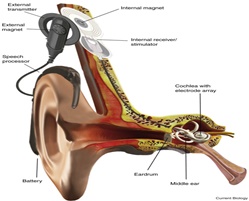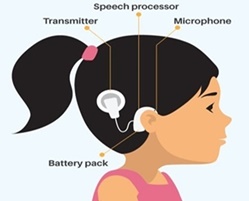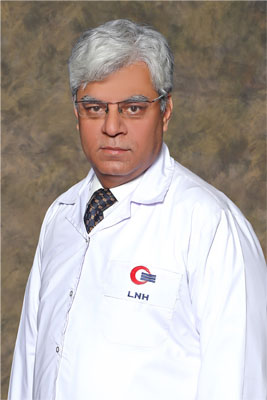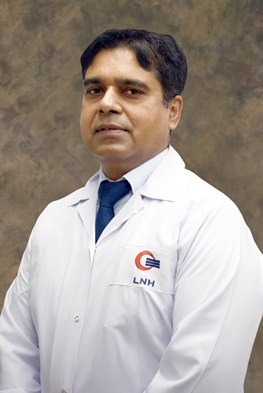Liaquat National Hospital has started a Cochlear Implant Program for severe to profoundly deaf children who do not benefit from the most powerful hearing aid. These children are able to hear with a cochlear implant.
At LNH, we bring together all the experts in different specialties at one place. Once your child is enrolled in the clinic all the different stages starting from hearing evaluation, medical evaluation, psychological assessment, pre-operative investigations, implant surgery and post-operative switching-on of the device and aural rehabilitation is done by our dedicated team.
Our emphasis is on early diagnosis and implantation so that rehabilitation process can start and language development does not suffer.
What is a Cochlear Implant?
A cochlear implant is a small, surgically implanted electronic device that can give a deaf child a sense of sound. Cochlear implant bypasses the normal acoustic hearing process and replaces it with electric signals which directly stimulates the auditory nerve (nerve of hearing).
Internal Part
This part is placed under the skin behind the ear during an operation. Thin wire electrodes lead from the coil to the cochlea which is part of inner ear. The wire sends signals to the cochlear nerve directly, bypassing the normal hearing mechanism of the ear, which sends sound information to the brain to produce a hearing sensation.
Patient Evaluation process
All the patients are seen by the implant team in our ‘Childhood deafness & cochlear implant’ clinic. A comprehensive evaluation is done by all the members of the team and a management plan is made. We put great emphasis on imparting information and extensive counselling of parents about deafness of their child, the disease process and their expectation.
Cochlear Implant Team
All you need in one place!
We have a team approach to cochlear implantation so that all the services for implantation are provided within our hospital.
An implant surgeon leads the team which is comprised of Audiologists, Speech and language therapists and a Clinical Psychologist. We work with the parents to decide if a cochlear implant will help their child.
The Otolaryngologist is the team leader of implant team. He assesses the child from a medical perspective to ensure that a cochlear implant is an appropriate option. He is the person who is eventually going to carry out the surgical procedure of implantation.
Audiologists are the experts who measure your child’s hearing levels with and without hearing devices. The audiologist will also assess your child’s understanding of speech with their devices. They have a pivotal role in deciding if your child will need a cochlear implant. After surgery, to place the implant, the audiologist switches on the device. They are also trained to do ‘mapping’ of the patient’s device and monitoring its use.
The SLT assesses how well your child can listen and communicate with hearing devices (hearing aid or cochlear implant). The SLT teaches listening and language skills to improve their speech and communication. Children need extensive therapy to get the full benefit from an implant. They also need to be undergoing therapy for long period of time.
Clinical Psychologist assesses child’s cognitive function and general development. The Psychologist helps to ensure that the family has enough commitment and support to go through the implantation and rehabilitation process.
Frequently Asked Questions
No, cochlear implant does not restore normal hearing. It is a listening device and a communication tool but ‘NOT A CURE’ for deafness.
If your child has a permanent hearing loss of severe to profound degree and cannot hear or understand speech well enough and is not able to hear even with a powerful hearing aid, he may benefit from an implant.
For speech and language development we need to hear. Most of the development of a child’s brain happens in the first five years of life. Children can be implanted as young as 12 months of age and certainly no later than 4 years. Early implantation provides your child with access to voices and speech, which is critical in development of strong language and speech.
Normally, we hear from both ears and this has several advantages over unilateral hearing (hearing from one ear).
- better localization of sound – direction from which the sound is coming.
- better hearing in noisy environment.
No, it is not true. A nerve deafness, once established, has no known treatment and does not get better on its own. You should immediately consult an ENT doctor so that a plan of rehabilitation can be designed for your child and his treatment is started without further delay.
No, the implant is designed to last a lifetime. The external device which is worn behind the ear is dependent on the software and can be upgraded to newer versions as technology advances.
When not wearing the implant, the child can swim, shower or take part in other water activities but is not allowed skydiving or scuba diving as there are significant air pressure changes, which are not advisable. The child can take part in other sporting activities, though wearing of protective head gear is recommended.






